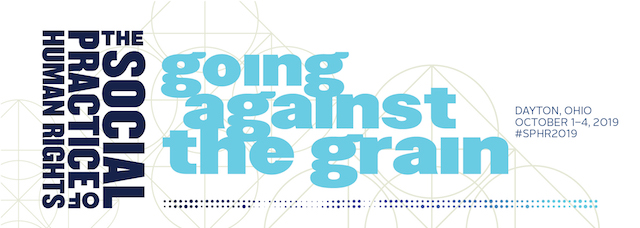Location
Paradigm Shifts: Migrant and Refugee Rights
Start Date
10-3-2019 11:00 AM
End Date
10-3-2019 12:30 PM
Keywords
migration, US border enforcement, space of encounter, experiential pedagogy
Abstract
In this paper, I examine the political dimensions and possibilities of the Migrant Trail, a 7-day, 75-mile collective walk from Sasabe, Sonora to Tucson, Arizona that seeks to witness and contest the dangerous and sometimes fatal conditions created by US border enforcement. I conceptualize the Migrant Trail as both a space of encounter (encuentro) and a pedagogical space that facilitates learning by exposing the consequences of prevention through deterrence strategies that weaponize the desert to control migration. As an autonomous political intervention, the Migrant Trail acts politically by reframing relations between people and creating a political space for dialogue that activates both individual and collective transformation, and compels further political action by generating critical insights among participants.
This pedagogical space teaches participants about the cause and structure of migrant fatalities through an embodied experience. As participants traverse the desert as a collective, they are able to differentiate between the natural state of the desert and its weaponization. In particular, the walk exposes the extent to which border policies manufacture extreme vulnerability and strategically undermine the resources of people in transit by funneling migrants into remote corridors of the desert. While the walk is physically strenuous and emotionally challenging, it is relatively safe and secure. In fact, surviving this difficult journey (with ample resources) reveals to many participants that migrant fatalities are not natural consequences of a deadly environment, but deliberately constructed by US border enforcement strategies. At the same time, walking the Migrant Trail positions participants as frontline observers and political actors. By collectively witnessing the deadly conditions created by border enforcement and publicly remembering the names and stories of people who have died crossing, walkers preserve their memory, and interrupt state policies that actively disappear people in transit.
Author/Speaker Biographical Statement(s)
Abby C. Wheatley is a cultural anthropologist with research and teaching interests in international migration and mobility, human rights, and transnational community regeneration. Spanning two regions, the US-Mexico and EU-Africa borders, her research considers the mechanisms through which migration becomes a dangerous and deadly endeavor, the strategies developed by people in transit to survive precarious crossings, and local efforts to circumvent failed immigration and refugee policies.
Cultivating Political Engagement on the Migrant Trail
Paradigm Shifts: Migrant and Refugee Rights
In this paper, I examine the political dimensions and possibilities of the Migrant Trail, a 7-day, 75-mile collective walk from Sasabe, Sonora to Tucson, Arizona that seeks to witness and contest the dangerous and sometimes fatal conditions created by US border enforcement. I conceptualize the Migrant Trail as both a space of encounter (encuentro) and a pedagogical space that facilitates learning by exposing the consequences of prevention through deterrence strategies that weaponize the desert to control migration. As an autonomous political intervention, the Migrant Trail acts politically by reframing relations between people and creating a political space for dialogue that activates both individual and collective transformation, and compels further political action by generating critical insights among participants.
This pedagogical space teaches participants about the cause and structure of migrant fatalities through an embodied experience. As participants traverse the desert as a collective, they are able to differentiate between the natural state of the desert and its weaponization. In particular, the walk exposes the extent to which border policies manufacture extreme vulnerability and strategically undermine the resources of people in transit by funneling migrants into remote corridors of the desert. While the walk is physically strenuous and emotionally challenging, it is relatively safe and secure. In fact, surviving this difficult journey (with ample resources) reveals to many participants that migrant fatalities are not natural consequences of a deadly environment, but deliberately constructed by US border enforcement strategies. At the same time, walking the Migrant Trail positions participants as frontline observers and political actors. By collectively witnessing the deadly conditions created by border enforcement and publicly remembering the names and stories of people who have died crossing, walkers preserve their memory, and interrupt state policies that actively disappear people in transit.



